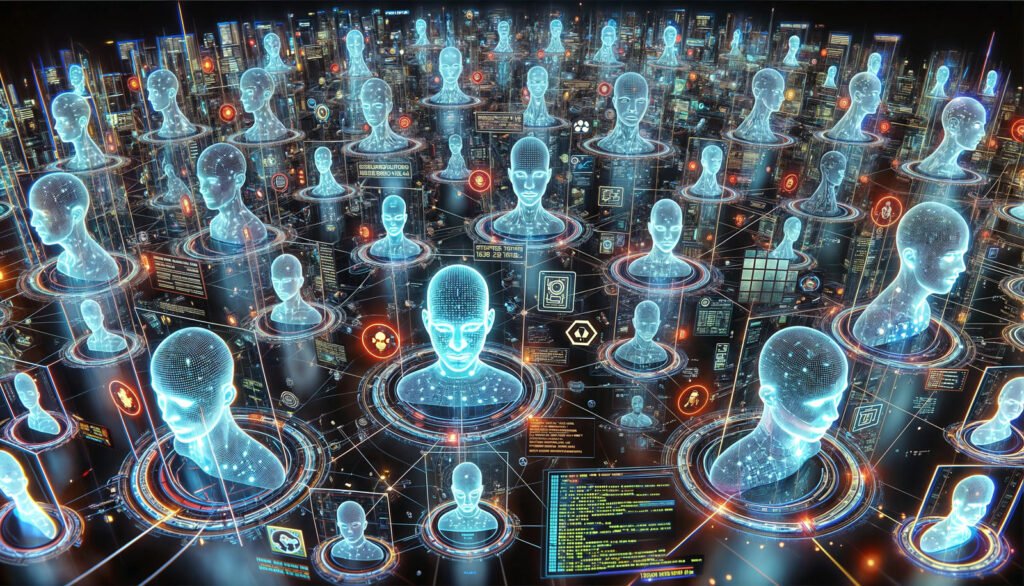The AI technology landscape is evolving at a rapid pace, driven by advancements in machine learning, natural language processing (NLP), computer vision, and robotics. As AI becomes increasingly integrated into various industries, understanding its landscape is essential for businesses and individuals alike. This article delves into the current state of AI technology, highlighting its key components, applications, and the future trends shaping its development.
Key Components of AI Technology
AI technology is built on several foundational components, each contributing to the system’s ability to mimic human intelligence. These include:
- Machine Learning (ML): Machine learning is the backbone of AI, allowing systems to learn from data and improve over time without being explicitly programmed. ML algorithms analyze patterns in data, enabling AI to make predictions, classify information, and even generate content. Supervised learning, unsupervised learning, and reinforcement learning are the three primary types of machine learning.
- Natural Language Processing (NLP): NLP enables AI to understand, interpret, and generate human language. This technology powers virtual assistants, chatbots, and language translation tools. NLP involves various subfields, including sentiment analysis, machine translation, and speech recognition, all of which contribute to more natural and intuitive human-computer interactions.
- Computer Vision: Computer vision enables machines to interpret and understand visual information from the world, similar to how humans do. This technology is crucial in applications such as facial recognition, autonomous vehicles, and medical imaging. By analyzing visual data, AI can identify objects, detect patterns, and make decisions based on what it “sees.”
- Robotics: Robotics is the integration of AI with physical machines, allowing robots to perform tasks autonomously or semi-autonomously. AI-powered robots are used in manufacturing, healthcare, logistics, and more, where they perform tasks ranging from assembly line work to surgery.
Applications of AI Technology
AI technology is transforming industries across the board, with applications that are reshaping how businesses operate and how individuals interact with technology. Here are some key areas where AI is making a significant impact:
- Healthcare: AI is revolutionizing healthcare by enabling early diagnosis of diseases, personalized treatment plans, and efficient management of healthcare resources. Machine learning algorithms analyze medical data to predict patient outcomes, while NLP helps in processing clinical documentation. AI-powered robots assist in surgeries, improving precision and reducing recovery times.
- Finance: In the financial sector, AI is used for fraud detection, risk management, algorithmic trading, and personalized financial advice. Machine learning models analyze large datasets to detect fraudulent activities and predict market trends. Chatbots and virtual assistants provide customers with personalized financial advice and support.
- Retail: AI is enhancing the retail experience by enabling personalized shopping experiences, optimizing inventory management, and improving customer service. Retailers use AI to analyze customer behavior, predict trends, and recommend products. Computer vision technology is also used in cashier-less stores, where customers can simply pick up items and leave, with AI handling the billing process.
- Manufacturing: AI is driving efficiency in manufacturing through predictive maintenance, quality control, and automation. Machine learning models predict equipment failures before they happen, reducing downtime and maintenance costs. Robotics and computer vision technologies are used for quality inspection and automating repetitive tasks on the assembly line.
- Transportation: AI is at the core of autonomous vehicles, optimizing routes for delivery services, and improving traffic management. Machine learning algorithms enable self-driving cars to navigate roads safely by processing data from various sensors. AI also helps in optimizing logistics and supply chain operations by predicting demand and managing inventory.
Future Trends in AI Technology
The future of AI technology is promising, with several trends set to shape its development:
- AI Ethics and Regulation: As AI becomes more prevalent, ethical concerns regarding data privacy, algorithmic bias, and job displacement are gaining attention. Future developments in AI will likely involve stricter regulations and the implementation of ethical AI frameworks to ensure technology is used responsibly.
- Explainable AI: One of the challenges of AI is its “black box” nature, where the decision-making process is not transparent. Explainable AI aims to make AI systems more transparent and understandable, allowing users to trust and verify AI’s decisions. This trend is particularly important in critical areas like healthcare and finance, where decisions can have significant consequences.
- AI and Edge Computing: With the rise of IoT devices, there’s a growing need for AI to operate on the edge, closer to where data is generated. Edge AI reduces latency and bandwidth usage by processing data locally, rather than sending it to a centralized cloud. This trend will enable real-time decision-making in applications like autonomous vehicles, smart cities, and industrial automation.
- AI in Creative Industries: AI is making inroads into creative fields like art, music, and content creation. Generative AI models, like GPT and DALL-E, can create original content, from writing articles to generating images and music. While AI-generated content is still in its infancy, the potential for AI to assist or even collaborate with human creators is vast.
Conclusion
The AI technology landscape is vast and continually evolving, with innovations that are reshaping industries and everyday life. From healthcare to finance, retail to manufacturing, AI is becoming an integral part of how we live and work. As AI technology continues to advance, the focus will increasingly shift towards ethical considerations, transparency, and the integration of AI with other emerging technologies like edge computing and IoT. Understanding this landscape is crucial for anyone looking to harness the power of AI, whether for business, research, or personal use.
For expert consultancy on AI tools and strategies, contact Visiontact, your partner in navigating the future of AI technology.
4o

